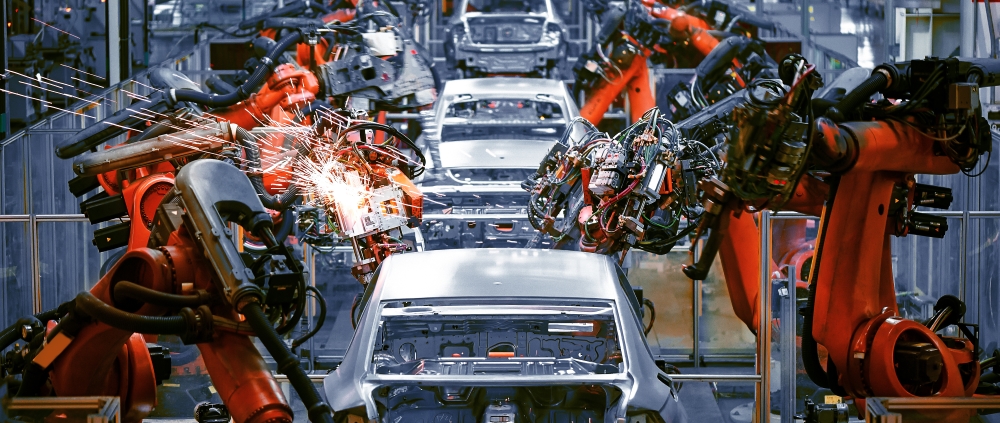How Does Automation Impact the Manufacturing Industry?
It’s challenging to predict how technology will progress in the future when it comes to the manufacturing sector – however, one thing is clear: automation will play a big role. In fact, automation is already crucial for the industry, as well as for other sectors such as aerospace, oil & gas, rail and energy, for example.
In order to implement a new era in global manufacturing, businesses need to invest in automation. In this article, we will discuss how this element impacts manufacturing and the many benefits it offers.
Automation in UK Manufacturing
According to a study by the PwC (PDF), automation could impact up to 30% of UK jobs by the early 2030s and affect different types of workers and industries. Manufacturing, as well as transportation and storage, are set to have the highest share of existing jobs that could be automated by the 2030s at, approximately, 45% and 52% respectively.
But this automation doesn’t mean robots will take our jobs. On the contrary, the idea of ‘cobots’ – or collaborative robots – can be a gamechanger for the sectors, including manufacturing. By offering efficiency without risking employment prospects or a company’s bottom line, this type of automation can actually boost productivity. While the UK has been reticent about incorporating robots into manufacturing, with an average of 74 units per 10,000 employees, cobots can transform the way we do manufacturing.
To keep up with global competition, especially after Brexit, it’s vital that UK manufacturers invest in technologies and automation in their facilities – a major downside of choosing not to employ automation is to stagnate and fall behind other manufacturing companies, whether in the UK or around the world. In order to remain competitive and look ahead, therefore, the UK is taking measures that include purchasing 2,600 multi-purpose industrial robots in 2021, according to Citibank.
The Benefits of Investing in Automation
Using automation technologies, such as robots, means a machine can run for 24 hours a day without interruption or supervision. Unlike human employees, robots can perform repetitive and dangerous tasks without the risk of injury or exhaustion, which also lead to improved health and safety in the workplace.
Automation is capable of greatly improving the efficiency of manufacturing operations at the same time it reduced costs. It also allows one single facility to produce a variety of products and boost output (a machine capable of packing a large number of units per minute or hour can improve a company’s bottom line).
Many believe that, by having robots working alongside employees, productivity can soar. In fact, the Manufacturer’s Annual Manufacturing Report 2018 found that 92% of manufacturers think that ‘smart factory’ technologies will enable them to increase their productivity levels. This is because robots and other advanced technology can not only perform daily tasks tirelessly, but also allow businesses to be more innovative and help them to offer new services to customers.
The fear of unemployment shouldn’t hold UK manufacturing back, as automation can actually help to solve labour shortages. For example, automation can lead to the creation of job roles like robot maintenance. For specifically, the World Economic Forum estimates that robots can lead to the creation of 133 million jobs at a worldwide scale over the next decade. In order to minimise the fears of losing jobs to robots, it’s important to invest in retraining and upskilling as well, which can manage the transition from human-led to machine-led processes and factories.
The so-called cobots don’t require an extensive amount of skills, such as programming. The necessary training to learning how to work with them could take around 90 minutes, for instance, and can be compared to the learning skills associated with working on a smartphone. Automating tasks that are straining or time-consuming is a common practice in manufacturing and can help to move the workforce to job positions that rely more on soft skills like communication and problem-solving.
It’s also important to note how automation can impact the global economy. According to the PwC, the potential boost to the global GDP from investing in artificial intelligence could be, approximately, £12.4 trillion by 2030. This economy benefit and extra wealth can lead to the creation of more jobs as well.
Automation at Dean Group
As a company specialising in investment castings, we know all too well just how important it is to employ advanced technologies and automation in our facility (we also believe in training our staff, be it in investment casting or in the new technologies we adopt). Recently, we have decided to upgrade our robot equipment for the investment casting area, which will help us to continue delivering high-quality products in a timely manner.
Get in touch with Dean Group today and a friendly member of our team will be on hand to discuss your next project with you or answer any questions you may have about our manufacturing services.
Registered in England VAT No: 146307478 Company Registration No: 1062820





